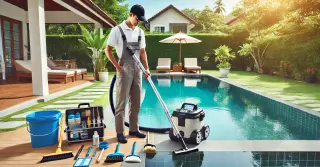Residential Pool Maintenance Glen Mills PA

Effective residential pool upkeep begins with consistent cleaning and debris management. Maintaining a clean pool free from debris is crucial for both appearance and hygiene.
- Skimming Debris and Vacuuming Dirt: Regular skimming and vacuuming are vital tasks for maintaining a clean pool. Utilize a pool skimmer to clear floating debris like leaves and insects, and vacuum the pool’s floor to remove dirt and sediment. This helps maintain water clarity and stops algae and bacteria growth.
- Brushing Pool Walls and Cleaning Tiles: Remember to clean the pool walls and tiles regularly. Brushing the walls and scrubbing the tiles prevents algae, calcium, and residue buildup. Use a pool-specific brush, be it plaster, fiberglass, or vinyl, to ensure safety. Routine cleaning maintains your pool’s pristine appearance and extends its lifespan.
Maintaining Pool Water BalanceBalancing the water chemistry is crucial for the safety and comfort of swimmers. Proper chemical levels prevent algae, bacteria, and other contaminants, while also safeguarding your pool's structure and equipment.
- Testing and Adjusting Chemical Levels: Regularly test your pool water to monitor chemical levels, including pH, chlorine, alkalinity, and calcium hardness. Use a dependable pool test kit for accurate results. Adjust the chemical levels as needed to ensure balanced water. Well-balanced water prevents corrosion, scaling, and cloudiness, ensuring a safe and pleasant swimming environment.
- Proper Pool Chemical Use: When adding chemicals to your pool, always adhere to manufacturer instructions and use proper safety equipment, such as gloves and goggles. Add chemicals in the proper sequence, and avoid mixing them directly, as this can cause dangerous reactions. Store chemicals in a cool, dry place, out of children’s and pets' reach. Using pool chemicals safely protects you and your family and maintains water quality.
Inspecting and Maintaining EquipmentRoutine inspection and upkeep of pool equipment are vital for smooth pool operation. This involves pumps, filters, heaters, and chlorinators, which are all key components in keeping your pool clean and functional.
- Maintaining the Pool Pump and Filter: Frequently inspect your pool pump and filter to ensure they are functioning correctly. Clean or replace filter cartridges as necessary for optimal filtration. A well-maintained pump and filter keep water clear and free of impurities, reducing the workload on your chemical treatments.
- Inspecting Heaters and Chlorinators: Make sure your pool heater and chlorinator are functioning correctly. Look for signs of wear and tear, such as leaks, corrosion, or malfunctioning parts. Routine maintenance and prompt repairs can prevent costly breakdowns and extend the life of your equipment. A properly functioning heater ensures pleasant water temperatures, while a working chlorinator keeps the water clean.
Maintaining a residential pool entails consistent cleaning, chemical balance, and equipment upkeep. By sticking to these steps, you can ensure a safe, clean, and inviting pool all season long.




